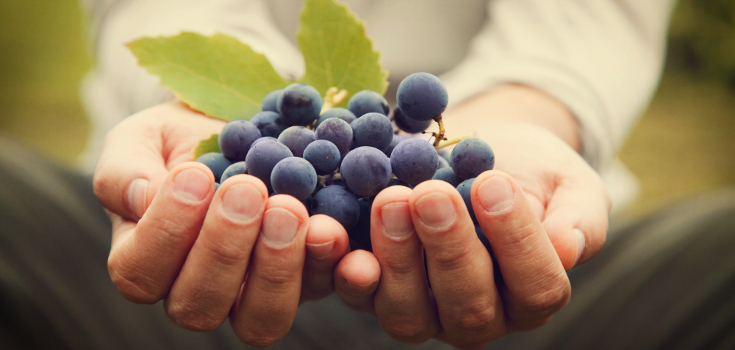Monsanto’s Pesticide May Kill $2 Billion Wine Industry

Dow and Monsanto’s failed glyphosate-resistant crops have caused cotton farmers in Texas to reach for a new concoction of chemicals, namely 2,4-D and dicamba. They are threatening the viability of vineyards across Texas.
The $2 billion wine and grape industry won’t be able to compete with the pesticide-heavy farms that surround their vineyards if wine lovers and GMO-free supporters don’t act. Due to the prevalence of superweeds created by Monsanto’s RoundUp, farmers are trying to eradicate them with new chemicals that create pesticide drift, often mutating vines on neighboring vineyards for multiple seasons of wine growing.
2,4-D chemicals have already put one farmer, Monty Dixon, president-elect of the Texas Wine and Grape Growers Association, out of business. When nearby wheat fields were sprayed with the chemical, his plants were damaged for more than one season. Dixon explains:
“It’s not just the clusters of grapes you see hanging that are harmed. It’s next year’s cluster and the cluster the year after that. You get a dose, it mutates the vines.”
Another winery, Bending Branch, started to notice problems when his grape leaves started to shrivel on the vine. He approached the nearby farmer who was using herbicides and asked him to stop. The farmer agreed he would switch to a ‘safer’ weed killer if the grape grower would pay the difference.
Bending Branch was forced to pay the farmer in order to try to keep his organic winery certification and ensure that a herbicide that was less prone to drift would be used. So – now we are paying farmers who use toxic, cancer-causing chemicals to NOT use them? Isn’t that a form of extortion?
Report: Crop Cross-Contamination can Not be Stopped
According to the National Pesticide Information Center, dicamba is:
“. . .a selective herbicide in the chlorophenoxy family of chemicals. It comes in several salt formulations and an acid formulation. These forms of dicamba have different properties in the environment. Products with dicamba frequently contain other herbicides as well.”
I’d say dicamba herbicide isn’t too selective if it is prone to drift onto an organic winery or farm, damaging its plants, its pollinators, and its soil. Of course, Monsanto will take no accountability – but now even farmers using the stuff won’t either?
I suggest this particular farmer should visit someone from the Who’s Who of Organic Farming in America for some tips. There are over 1900 organic farmers across America who do take responsibility for their actions (including not poisoning the soil, and people) – he should too.

NORAHG RESPONDS AGAINST WINE GROWERS IN TEXAS ― PRODUCERS MAY ACTUALLY BE HARMING THEIR OWN GRAPES, AND CERTAINLY KNOW NOTHING ABOUT THE AGRICULTURE INDUSTRY !
Wine & grape growers may be DECEIVING the public with imaginary danger about 2,4-D and other herbicides. How can the public believe these growers when there is NO evidence to suggest a link between pest control products and their damaged plants. Their stories are implausible and unverifiable, and, therefore, cannot be trusted ! However, the wine & grape growers themselves may be harming their own plants. Most likely, plant deaths are the fault of wine & grape growers and their mis-management practices. They are responsible, and NOT pest control products. In their usual method of arriving at scientifically illiterate conclusions, anti-pesticide wine & grape growers have somehow concocted the imaginary danger in order to deflect attention from the real problems. They may be the least qualified to provide any advice on this issue, and may not be competent to manage their plants. Wine & grape growers may be seeking illegitimate compensation. If we had less conventional herbicide use in the environment, we would still have plant losses, because many wine & grape growers are just not competent to manage their plant. PROHIBITING products manufactured by Monsanto WILL NOT SAVE the wine & grape industry. That is LUDICROUS ! Furthermore, it is also LUDICROUS to believe that organic farming will somehow save the wine & grape industry. Organic Food has been a DISMALLY BOGUS FAILURE. The implication by wine & grape growers that organic pesticide-free food will someday replace conventional food is equally LUDICROUS. Even MORE LUDICROUS is the expectation that conventional pest control products will someday and somehow no longer be necessary for agriculture. Any restriction against the use of conventional pest control products would result in a SUBSTANTIAL REDUCTION IN HARVESTS and a related SUBSTANTIAL INCREASE IN FOOD COSTS, LACK OF AFFORDABLE FOOD, HUGE INCREASES IN STARVATION, and tens of thousands of additional DEATHS among the poor of the world. http://wp.me/P1jq40-2m8 Wine & grape growers KNOW NOTHING ABOUT THE AGRICULTURE INDUSTRY ! We are the National Organization Responding Against HUJE that seek to destroy the Green space and other industries ( NORAH G ). We are dedicated to reporting PESTICIDE FREE FAILURES, as well as the work of RESPECTED and HIGHLY RATED EXPERTS who promote ENVIRONMENTAL REALISM and PESTICIDE TRUTHS. Get the latest details at http://pesticidetruths.com/ http://pesticidetruths.com/toc/ http://wp.me/P1jq40-2rr https://www.facebook.com/norah.gfon WILLIAM H GATHERCOLE AND NORAH G
Herbicide, not pesticide.
Why not have pesticide based farms do their work in a sealed off dome? Or will the organic farmer have to resort to such for protection?
And yet vaccine loving “Philanthropist” Bill Gates and his best mate Warren Buffet have Millions of Dollars invested in Monsanto shares….strange huh?
The better solution is to start a class action suit by all organic farmers against Monsanto for CONTAMINATING their pristine crops and land. You would think some smart lawyers would jump on this opportunity.